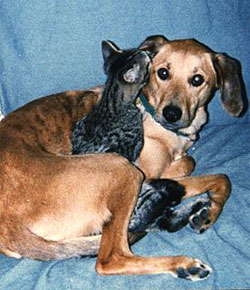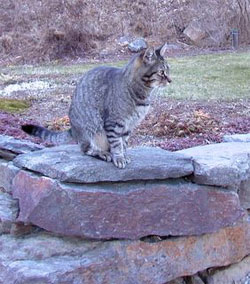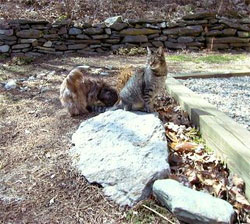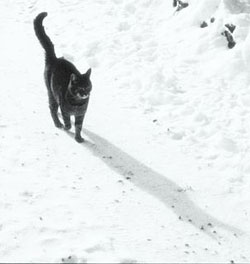Years ago I heard an interview in which author Ray Bradbury extolled the value of fan letters. He wasn’t just referring to the letters that his own fans had written him that had given him great joy, but also to those letters he himself had written to those from all walks of life. I still recall his passionate message: Don’t put it off. Do it now. Tell them before they die how much you admire them.
Not to long ago, it hit me that Whittington is going to be 14 this spring, a thought that elicited all those death-related concerns, and with them the certainty that I would write a tribute to him. But then I remembered what Bradbury had said. Why wait until Whittington dies to pay tribute to him? Why not write a fan letter to him right now?
And so I did.
Whittington the Cat was born the end of March, beginning of April under a porch in 1994. By today’s standards, that would have made him feral, but he’d have none of that. He knew he wasn’t feral any more than his mother was. There’s no shame in being born on the wrong side of the porch, as it were. No need to deny his mother was a stray.
 Far too soon Whittington was separated from his mom and put up for adoption. Sure, he was big enough to eat kitten food, but he still needed her comfort. Luckily for him, he came into my life about the same time as Watson the Hound, and Watson allowed Whit to suck on his ear or head when life overwhelmed him. Had he not chosen Watson and had Watson not so graciously accepted, I would have given him a toy or blanket to suck instead. (Fortunately, by then I knew that animals suck for comfort as well as nourishment and that the timeframe of the latter may be much longer than the former.) I would lie in bed at night and hear the sucking sounds coming from the dog bed beside mine, then the purrs, then the soft sounds of feline sleep as Whit drifted off contentedly.
Far too soon Whittington was separated from his mom and put up for adoption. Sure, he was big enough to eat kitten food, but he still needed her comfort. Luckily for him, he came into my life about the same time as Watson the Hound, and Watson allowed Whit to suck on his ear or head when life overwhelmed him. Had he not chosen Watson and had Watson not so graciously accepted, I would have given him a toy or blanket to suck instead. (Fortunately, by then I knew that animals suck for comfort as well as nourishment and that the timeframe of the latter may be much longer than the former.) I would lie in bed at night and hear the sucking sounds coming from the dog bed beside mine, then the purrs, then the soft sounds of feline sleep as Whit drifted off contentedly.
Perhaps because Watson allowed him to do this, from the beginning Whit had a very special relationship with the dog. That Watson permitted him to nurse would seem to lead to the obvious feline conclusion that Watson was his mother. However, Watson had the habit of doing some distinctly unfeline things that disrupted this illusion. The worst of these was that, unlike a well-bred cat like Whittington, Watson did not dig a hole, eliminate in it, and neatly cover it when he finished.
I can still clearly recall the look of utter horror that crossed Whit’s face the first time he happened to be in the vicinity when the dog just, God forbid, took a dump and walked away. It was winter and at first the cat just stood there and looked from the dog to that pile of poo and back again, perhaps trying to will the canine to rectify this gross oversight. When Watson wandered off to do other doggy things, Whit set about covering the pile with snow, just as a child might cover a faux pas committed by a beloved adult.
Fortunately, Whittington is very smart and was able to figure out most of the early cat lessons he missed on his own. Aside from the little quirks introduced into his behavior by his relationship with Watson, he was completely and unapologetically a cat. Just as he shrugged off definitions of himself as feral, he also found the idea that some considered domestic cats a social species relative to their own kind laughable. As soon as he hit maturity, he had no use for any cat in his yard or his house. Although he’s a small cat, he’s always been a very big feline presence.
Nor did Whittington ever rush to greet visitors to my home. On the contrary. His immediate response was to disappear. But this was always by choice, not out of fear, something he proved conclusively on two occasions. The first occurred when a crew was filming a segment on feline behavior here at the house. I’d recruited a couple more social cats because I knew Whit wouldn’t cooperate and the crew was well aware of this. As they were packing up their equipment after we finished, several commented on their desire to see the ephemeral resident cat. Sure enough and as if on cue, as soon as they were all loaded up and beginning to back their vehicle out of its parking space, Whit appeared and sat on the front step and groomed himself as if he’d been there all the time.
The second instance requires that I set the scene. I live in a very old house and, I’ve discovered, some people do not like very old houses because of their real or imaginary strange noises. There are times when Whittington sleeps in a floor-to-ceiling cupboard in the bathroom that has one of those louvered doors that looks like it consists of two smaller doors that open from the middle, but there’s actually a hinge in the middle. Because of this, Whit can open it t by hooking his paw under the bottom of the door near the hinge and pulling it. Once he does, he jumps onto the bottom shelf and curls up to sleep on an old fleece shirt of mine in the corner.
 Sometimes when I’ve been expecting company, I’ll notice that the door is slightly open and automatically shut it, forgetting that he might be sleeping in there. On several occasions, Whit has waited until someone has come into the bathroom to use the toilet, then slowly opened the door from the inside. So far, the answer to the question, “Who is more shocked, women or men?” is that it’s pretty much a draw. Women who have watched the door slowly open while they were sitting on the john seem as stunned as men who were standing peeing with their back to said closet when they heard the door began to open. In all cases, once he opened the cupboard door, Whit then appeared and calmly walked to the bathroom door and politely waited to be let out.
Sometimes when I’ve been expecting company, I’ll notice that the door is slightly open and automatically shut it, forgetting that he might be sleeping in there. On several occasions, Whit has waited until someone has come into the bathroom to use the toilet, then slowly opened the door from the inside. So far, the answer to the question, “Who is more shocked, women or men?” is that it’s pretty much a draw. Women who have watched the door slowly open while they were sitting on the john seem as stunned as men who were standing peeing with their back to said closet when they heard the door began to open. In all cases, once he opened the cupboard door, Whit then appeared and calmly walked to the bathroom door and politely waited to be let out.
Perhaps the reason Whittington is so unabashedly solitary and territorial, i.e. so quintessentially country cat, is because he is also such a skilled predator. Hunting is not a team endeavor for small cats. It requires a tremendous amount of knowledge, patience and self-control. One mistake and it can cost a cat a meal or even his life.
For those who live in more controlled environments, the predatory cat is an embarrassment, a violation of the Peaceable Kingdom mystique. But the core of my house was built in the 1700s and one, mortarless stone wall in the basement is literally at one with the earth. I have had water snakes glide over my feet while I was moving laundry from the washer to the dryer. I have liberated I don’t know how many rodents from the recycling containers near the wall. (Once I somehow missed a rat in one of them-until he ran over my feet when I was driving to the dump!) Were it not for Whit, I would have to use chemicals to kill these critters because otherwise nothing in my house on that large menu of rodent edibles would be safe. As it is, they and he have established a workable balance. They can live and raise their families within the shelter of the crawl space under the living room, but if they dare venture into the house itself, they will regret it. Unless, of course, I happen to be around.
 Even though I do appreciate Whit’s hunting skills, I have been known to interrupt a hunt because… I really don’t know why. When I interrupt, he looks at me the same way he and his predecessor looked at the succession of pups they tried unsuccessfully to teach to hunt: with an expression of disdain tinged with pity, as if to say, “You still don’t get it, do you?” I’d like to claim some higher moral ground here, but I’m not that naive. I know he’s coming from a place that my limited human perception and thought processes, and perhaps even their resultant limited sense of morality, cannot take me.
Even though I do appreciate Whit’s hunting skills, I have been known to interrupt a hunt because… I really don’t know why. When I interrupt, he looks at me the same way he and his predecessor looked at the succession of pups they tried unsuccessfully to teach to hunt: with an expression of disdain tinged with pity, as if to say, “You still don’t get it, do you?” I’d like to claim some higher moral ground here, but I’m not that naive. I know he’s coming from a place that my limited human perception and thought processes, and perhaps even their resultant limited sense of morality, cannot take me.
Whittington also considers dogs the greatest cat toys ever invented. He uses his tail like a lure to entice the younger dogs to get close to his hiding place under the couch or behind the shower curtain. When they inevitably do, he spins and smacks them with his paws then takes off with them in hot pursuit. The games he plays with deaf, visually impaired BeeBee would hardly win any political correctness awards because he mercilessly capitalizes on her limitations. However, she doesn’t mind in the least when he sneaks up and bats her from behind because she didn’t see him sneak out from the far end of the couch like the other dogs would have. Once he does, she’s more than happy to shriek in delight and chase him in her unique uncoordinated, bouncy way.
 One would think that this glowing tribute would include something about Whit’s unfailing presence on my bed every night, his instinctive awareness of when I was feeling down and in need an encouraging head butt or purr, but such is not the case. Maybe he thinks I get enough of such fawning from the dogs. Maybe he thinks I should trust the love and not need such evidence. Maybe he thinks that, if I don’t trust it, I should learn.
One would think that this glowing tribute would include something about Whit’s unfailing presence on my bed every night, his instinctive awareness of when I was feeling down and in need an encouraging head butt or purr, but such is not the case. Maybe he thinks I get enough of such fawning from the dogs. Maybe he thinks I should trust the love and not need such evidence. Maybe he thinks that, if I don’t trust it, I should learn.
From the beginning and through more than a decade, above all, always a cat.
Years ago I heard an interview in which author Ray Bradbury extolled the value of fan letters. He wasn’t just referring to the letters that his own fans had written him that had given him great joy, but also to those letters he himself had written to those from all walks of life. I still recall his passionate message: Don’t put it off. Do it now. Tell them before they die how much you admire them.
Not to long ago, it hit me that Whittington is going to be 14 this spring, a thought that elicited all those death-related concerns, and with them the certainty that I would write a tribute to him. But then I remembered what Bradbury had said. Why wait until Whittington dies to pay tribute to him? Why not write a fan letter to him right now?
And so I did.
Whittington the Cat was born the end of March, beginning of April under a porch in 1994. By today’s standards, that would have made him feral, but he’d have none of that. He knew he wasn’t feral any more than his mother was. There’s no shame in being born on the wrong side of the porch, as it were. No need to deny his mother was a stray.
Perhaps because Watson allowed him to do this, from the beginning Whit had a very special relationship with the dog. That Watson permitted him to nurse would seem to lead to the obvious feline conclusion that Watson was his mother. However, Watson had the habit of doing some distinctly unfeline things that disrupted this illusion. The worst of these was that, unlike a well-bred cat like Whittington, Watson did not dig a hole, eliminate in it, and neatly cover it when he finished.
I can still clearly recall the look of utter horror that crossed Whit’s face the first time he happened to be in the vicinity when the dog just, God forbid, took a dump and walked away. It was winter and at first the cat just stood there and looked from the dog to that pile of poo and back again, perhaps trying to will the canine to rectify this gross oversight. When Watson wandered off to do other doggy things, Whit set about covering the pile with snow, just as a child might cover a faux pas committed by a beloved adult.
Fortunately, Whittington is very smart and was able to figure out most of the early cat lessons he missed on his own. Aside from the little quirks introduced into his behavior by his relationship with Watson, he was completely and unapologetically a cat. Just as he shrugged off definitions of himself as feral, he also found the idea that some considered domestic cats a social species relative to their own kind laughable. As soon as he hit maturity, he had no use for any cat in his yard or his house. Although he’s a small cat, he’s always been a very big feline presence.
Nor did Whittington ever rush to greet visitors to my home. On the contrary. His immediate response was to disappear. But this was always by choice, not out of fear, something he proved conclusively on two occasions. The first occurred when a crew was filming a segment on feline behavior here at the house. I’d recruited a couple more social cats because I knew Whit wouldn’t cooperate and the crew was well aware of this. As they were packing up their equipment after we finished, several commented on their desire to see the ephemeral resident cat. Sure enough and as if on cue, as soon as they were all loaded up and beginning to back their vehicle out of its parking space, Whit appeared and sat on the front step and groomed himself as if he’d been there all the time.
The second instance requires that I set the scene. I live in a very old house and, I’ve discovered, some people do not like very old houses because of their real or imaginary strange noises. There are times when Whittington sleeps in a floor-to-ceiling cupboard in the bathroom that has one of those louvered doors that looks like it consists of two smaller doors that open from the middle, but there’s actually a hinge in the middle. Because of this, Whit can open it t by hooking his paw under the bottom of the door near the hinge and pulling it. Once he does, he jumps onto the bottom shelf and curls up to sleep on an old fleece shirt of mine in the corner.
Perhaps the reason Whittington is so unabashedly solitary and territorial, i.e. so quintessentially country cat, is because he is also such a skilled predator. Hunting is not a team endeavor for small cats. It requires a tremendous amount of knowledge, patience and self-control. One mistake and it can cost a cat a meal or even his life.
For those who live in more controlled environments, the predatory cat is an embarrassment, a violation of the Peaceable Kingdom mystique. But the core of my house was built in the 1700s and one, mortarless stone wall in the basement is literally at one with the earth. I have had water snakes glide over my feet while I was moving laundry from the washer to the dryer. I have liberated I don’t know how many rodents from the recycling containers near the wall. (Once I somehow missed a rat in one of them-until he ran over my feet when I was driving to the dump!) Were it not for Whit, I would have to use chemicals to kill these critters because otherwise nothing in my house on that large menu of rodent edibles would be safe. As it is, they and he have established a workable balance. They can live and raise their families within the shelter of the crawl space under the living room, but if they dare venture into the house itself, they will regret it. Unless, of course, I happen to be around.
Whittington also considers dogs the greatest cat toys ever invented. He uses his tail like a lure to entice the younger dogs to get close to his hiding place under the couch or behind the shower curtain. When they inevitably do, he spins and smacks them with his paws then takes off with them in hot pursuit. The games he plays with deaf, visually impaired BeeBee would hardly win any political correctness awards because he mercilessly capitalizes on her limitations. However, she doesn’t mind in the least when he sneaks up and bats her from behind because she didn’t see him sneak out from the far end of the couch like the other dogs would have. Once he does, she’s more than happy to shriek in delight and chase him in her unique uncoordinated, bouncy way.
From the beginning and through more than a decade, above all, always a cat.